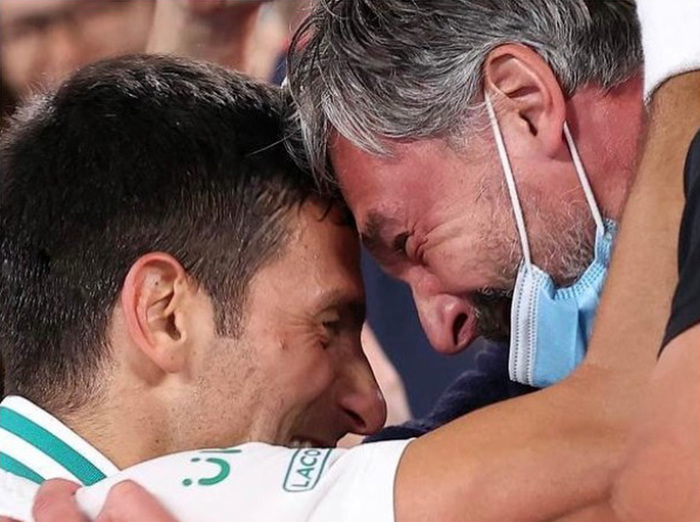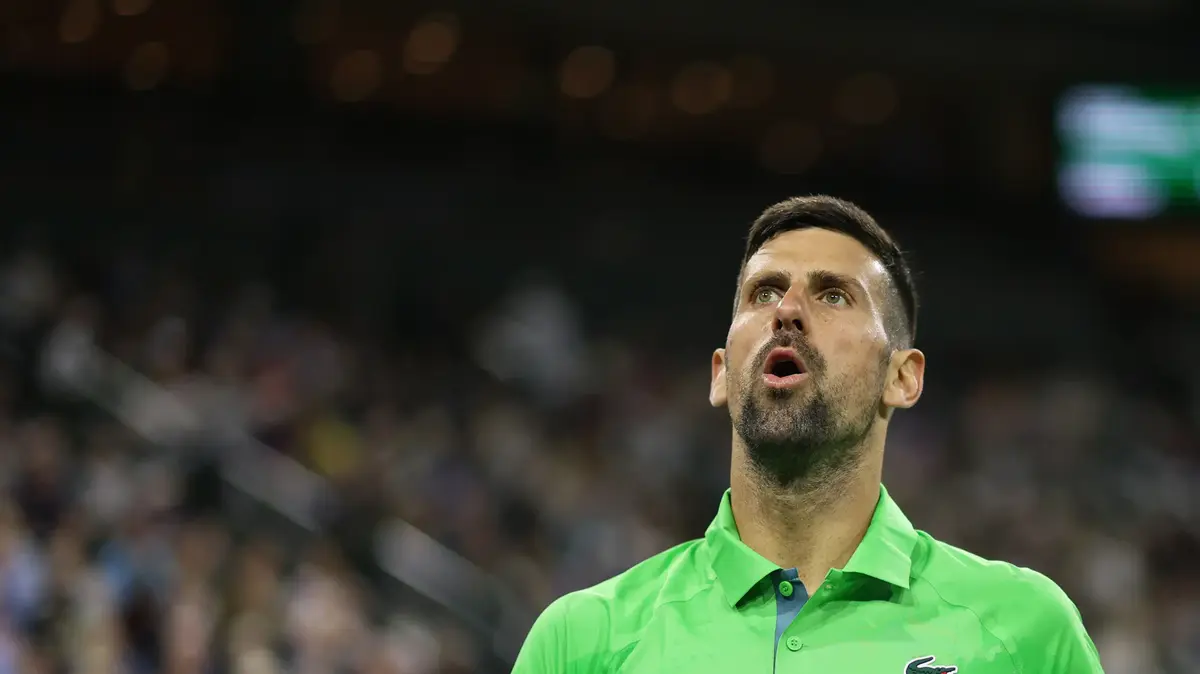Enlarge image
Novak Djokovic:
"A human error"
Photo:
Etienne Garnier / WITTERS
Tuesday of this week found tennis star Novak Djoković in Melbourne's Rod Laver Arena preparing for the Australian Open, which is set to start on Monday.
Almost as though nothing had happened.
The drone of a television broadcaster circled above the court, but the 34-year-old Serb was not to be distracted.
He simply kept pounding the balls with power and focus back across the net.
Just like he has always done.
Following the trouble at the airport upon arrival in Australia and after spending four nights in an immigration detention hotel run by the country's Border Force, the world's top-ranked tennis player wanted to put the focus back on what's important to him: his career as a professional athlete.
And perhaps Djoković really did believe until the beginning of this week that the affair surrounding his questionable PCR test, his incorrect statements on immigration documents filled out ahead of his arrival in Australia, and all the half-truths he has dished up in recent days would simply fade into the past.
But he was wrong.
At some point, it will no longer play much of a role whether Novak Djoković is ultimately allowed to play in the Australian Open – and with Immigration Minister Alex Hawke saying on Friday that he had used his ministerial discretion to revoke the tennis star's visa, it looks like he won't be, unless his appeal is successful.
There is simply too much at stake here.
With his behavior over the last two weeks, he has managed to become one of the most controversial figures in global sports, to the point that he has endangered his own legacy.
More on Djokovic
New Inconsistencies in the Novak Djokovic Case: Were the Results of a Positive PCR Test Manipulated? By Max Hoppenstedt and Jörn Meyn
With his attempt to play in the Australian Open as a committed anti-vaxxer, and with his subsequent battle with immigration authorities, Djoković has become a hero to corona truthers and conspiracy theorists around the world – and a pariah for all those who side with science and see vaccination as the only way out of this accursed pandemic.
Sports often become a stage for broad, social debates.
But the Djokovic affair is one of the most bitterly waged blowups we've seen in quite some time.
Critics of the tennis player and his supporters are rating each other in internet forums and on social media channels, while back home in Serbia, people took to the streets in protest when their beloved star athlete was detained for a time in the Melbourne detention hotel.
Serbian President Aleksandar Vučić called it a "political witch hunt” and the government in Belgrade summoned the Australian ambassador in protest. The more unyielding the Australians became, the more nationalistic were the tirades back home in Serbia.
Victim or charlatan?
The Djokovic situation is a complicated one.
For some, the sports star is a victim, a man who has become caught in the grasp of an overreaching bureaucracy.
But for the overwhelming majority of onlookers, Djoković is a brazen charlatan who is stubbornly following his own agenda with no regard for anything else.
A man whose only focus on his trip to Australia is on winning his 10th Australian Open and thus becoming the most successful tennis player of all time.
Consequences be damned.
When the tennis pro arrived at the Melbourne airport on Jan. 5, he was convinced that there would be no problems with entering the country.
He politely informed the border officials that while he wasn't vaccinated, he had been previously infected.
Djokovic presented a positive coronavirus test from Dec.
16 and a negative test from Dec.
22. The agent thanked him and disappeared with the documents.
When he returned, he told Djoković that despite his previous infection, he was not allowed into the country.
The athlete referred to a medical exemption from Tennis Australia and from a government authority from the state of Victoria.
Again, his documents were examined.
Hours went by, and slowly Djoković seemed to begin realizing that he might not be allowed into the country.
He asked the officials: "You're canceling my visa, or?"
And that is ultimately what happened, with Djoković being sent to the immigration detention hotel.
But on Monday, a Federal Circuit Court judge ruled in favor of the player on procedural grounds, ordering that he be allowed to leave the hotel and remain in the country.
It was a slap in the face for the Border Force, but it was far from the end of the affair.
On the contrary.
It soon became clear, after all, that Djoković's Australian Travel Declaration, which every traveler to the country must complete before entry, contained inaccuracies.
A legal representative for Djoković had checked the "no” box next to the question as to whether the Serbian athlete had traveled internationally during the two weeks before his flight to Australia. In fact, though, Djoković, who lives in Marbella, had been in both Spain and Belgrade during that time period.
"A human error," Djoković claimed in an Instagram post last Wednesday, apparently hoping that Immigration Minister Alexander Hawke would overlook it.
Vaccination as an Obligation to Society
On Thursday, Djokovic again practiced at the Rod Laver Arena, situated just across from the Royal Botanical Gardens on the Yarra River.
That afternoon, he was included in the draw for the tournament, with his compatriot Miomir Kecmanović being chosen as his first-round opponent.
At the same time, Immigration Ministry staff were poring over the documents provided by Djoković's lawyers, who were doing everything they could to ensure their client could play in the tournament.
The Djokovic show has not received positive reviews in Australia.
To be sure, he has been a popular presence at the Australian Open over the years, and his matches on Center Court have often been spectacular.
Now, though, pretty much the entire continent is against him.
Australia has been through a hard lockdown in this pandemic and around 90 percent of its adult population have been vaccinated.
Indeed, the vast majority view the corona vaccination as an obligation to society and see Djokovic's behavior as inappropriate and reckless.
In their eyes, he is just an anti-vaxxer who tried to use his status as tennis champion to get around the country's rules on vaccination.
And he did so at a time when the virus is once again spreading in Australia.
Indeed, officials in Victoria have reported almost 40,000 new cases a day over the last week.
Across the country, measures to contain the virus have again grown stricter, and attendance at the Australian Open has been limited to half of normal capacity.
Famous athletes are looked up to by children and adults alike. They are praised when they demonstrate support for human rights, stand up against racism or take action on behalf of the environment. When it comes to the coronavirus, the public expects a minimum of integrity and solidarity from sports stars. People around the world who have suffered as a result of this pandemic understandably find it distasteful when fabulously wealthy stars seek to take advantage of their privilege.
By and large, the best tennis players in the world have lived up to those expectations. The vast majority – 97 percent – of the top 100 professionals in the ATP rankings have been vaccinated. German Davis Cup player Dominic Koepfer, ranked number 54, was one of the first to receive his jab. "Our lives would be quite a bit easier if everybody would protect themselves from serious symptoms by getting vaccinated," he says.
Koepfer says he spoke briefly with Djoković in the dressing room after a training session.
"It was just as it has always been. He said hello as usual," Koepfer says, adding that the subject of vaccination didn't come up. "To be honest, it was clear to me from the start that he would get into the country somehow and be allowed to play," Koepfer says.
"But I really didn't think there would be this much drama."
Djokovic has never been secretive about the fact that he has no intention of being vaccinated against COVID-19.
He has a rather unique relationship with his body, repeatedly experimenting with bizarre healing methods, and is prone to surrounding himself with gurus.
Growing Displeasure
His approach was always respected in the tennis industry, or a least tolerated.
Tournament organizers didn't want to get on Djoković's bad side because fans love watching him play and he was also good for television ratings.
And Tennis Australia, the sport's governing body Down Under, is facing corona-related losses of 100 million Australian dollars and hoped that Djoković's popularity would help close that gap.
But the difficulties associated with his arrival in the country have led many to revisit their views of the Serbian tennis star, and some sponsors have carefully taken their distance.
Last year, Austria's Raiffeisen Bank International agreed to a sponsorship deal with Djoković, hoping that they would be able to expand their hold on Central and Eastern Europe with him as brand ambassador.
The initial euphoria with the deal, though, appears to have evaporated as a result of the tennis professional's problems in Australia.
A spokeswoman for the bank, in any case, declined to defend his behavior.
A written statement supplied by the bank sounds almost apologetic.
Djokovic, the statement notes, was signed to the sponsorship deal long before media coverage of his vaccination status.
"It goes without saying," the statement reads, that the bank will "closely monitor the current situation."
Either way, it is clear that outside of Serbia, the market value of the world's best tennis player has taken a substantial hit.
Displeasure with Djoković is also growing within the ranks of the players. Rafael Nadal labeled the commotion surrounding his arrival in Australia "a circus." Hungarian professional Márton Fucsovics, 38th in the world rankings, was more direct in comments he made to a Hungarian media outlet during a training session in Melbourne. "People's health is paramount, and there are rules that were outlined months ago, namely that everyone should vaccinate themselves, and Djoković didn't. From this point of view, I don't think he would have the right to be here."
Djoković's legal representative is hoping that his appeal against Immigration Minister Alex Hawke's Friday decision to re-revoke the Serbian athlete's visa will be heard on Sunday, ahead of the tournament start on Monday.
Should that appeal fail and Djokovic be deported, he could be slapped with a three-year ban on returning to the country, though such a ban could also be waived.
"People's health is paramount, and there are rules that were outlined months ago, namely that everyone should vaccinate themselves, and Djoković didn't."
Hungarian tennis professional Marton Fucsovics
But no matter what happens with his court case, it won't likely be the end of the story. There are simply too many other sensitive questions that still must be addressed. On Thursday, it was reported that Spanish officials are also investigating him because he entered the country in December without having been vaccinated and had not been granted an exemption.
DER SPIEGEL reporting also found inconsistencies with Djoković's PCR test that his lawyer claimed was from Dec.
16. An initial scan of the QR code returned a negative result, while a subsequent scan indicated that the test was positive.
Additional test data make it look as though the test could actually have been from Dec.
26. If Djoković was actually corona-positive at that late a date, then it would have been a violation of pandemic regulations for him to travel from Spain to Australia via Dubai on Jan. 4. Was the test backdated so that he could travel?
Was Djoković even infected with the virus at all?
Back to the hotel?
If he really did test positive for the virus on Dec.
16, it would have been extremely fortuitous timing for the tennis star.
It was essentially the only possibility for him, following recovery, to travel to Australia without being vaccinated.
And his behavior after Dec.
16, the day on which he allegedly tested positive for the coronavirus, will have consequences.
On Dec
17, he attended an event in Belgrade at which he presented prizes to children in clear violation of coronavirus rules in Serbia.
He wrote on Instagram that a rapid-antigen test prior to the event had returned a negative result.
"I was asymptomatic and felt good, and I had not received the notification of a positive PCR test result until after the event," he wrote.
But the tennis player also didn't quarantine on Dec.
18. Instead, he gave an interview to the French sports daily
L'Éqipe
.
He has insisted that he wore a mask throughout, except when he was being photographed, and maintained his distance.
"While I went home after the interview to isolate for the required period, on reflection, this was an error of judgment and I accept that I should have rescheduled this commitment."
Upon reflection?
The few statements that Djoković has made during this affair bear witness to one thing above all: his short-sightedness.
He simply can't understand all the excitement.
But he won't be able to leave it behind.
On Thursday evening, a camerawoman from a TV broadcaster could be found waiting in front of the Park Hotel, the detention hotel run by the Border Force.
She said she had been ordered to stay there in case Novak Djokovic was deported.
And with Friday morning's announcement, it looks as though she might have something to film, after all. While the world's best tennis player was allowed to remain free on Friday evening, he was scheduled to return to detention after his scheduled meeting with Australian border officials .
At 8 am on Saturday morning.







/cloudfront-eu-central-1.images.arcpublishing.com/prisa/KDCEOHMJRBODVI33DXPAD5XU7I.jpg)


/cloudfront-eu-central-1.images.arcpublishing.com/prisa/2C5HI6YHNFHDLJSBNWHOIAS2AE.jpeg)



